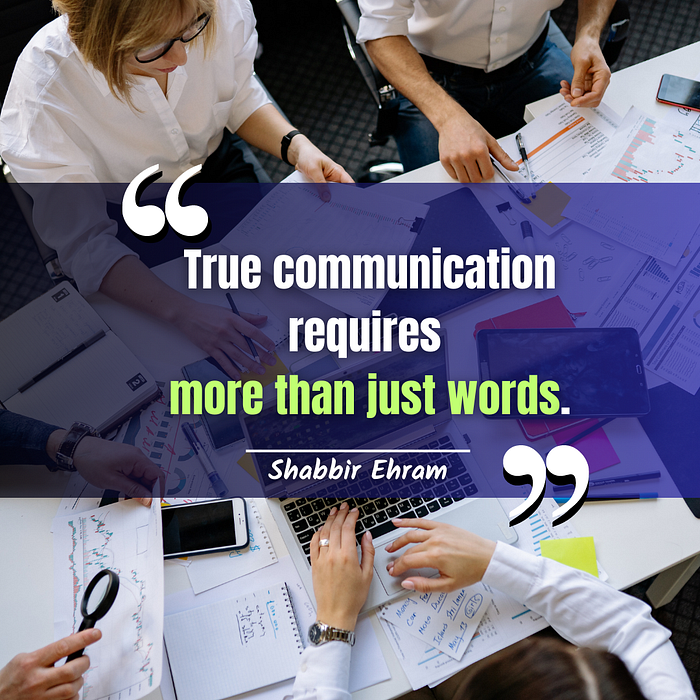Beyond Words: The Importance of Emotional Intelligence in Communication
Beyond Words: The Importance of Emotional Intelligence in Communication
by Shabbir Ehram | Corporate Trainer, Writer

Emotional intelligence is the ability to understand and manage our emotions and the emotions of others. It plays a vital role in effective communication, which is a cornerstone of personal and professional success. In this blog, we’ll explore the importance of emotional intelligence in communication and how it can help us build better relationships, resolve conflicts, and achieve our goals.
Why Emotional Intelligence Matters in Communication?
Emotional intelligence is essential in communication for several reasons:
- Builds Strong Relationships: Emotional intelligence enables us to connect with others on a deeper level, understand their feelings and perspectives, and build strong relationships. When we communicate with empathy and understanding, we foster trust and create a positive environment for collaboration.
- Resolves Conflicts: Conflicts are inevitable in any relationship or workplace, but emotional intelligence helps us manage them more effectively. By recognizing and managing our emotions and understanding the emotions of others, we can find common ground and resolve conflicts more quickly and peacefully.
- Increases Productivity: Effective communication is essential in the workplace to achieve goals and complete tasks efficiently. Emotional intelligence helps us communicate clearly, delegate tasks effectively, and provide constructive feedback, leading to higher productivity and job satisfaction.
- Enhances Leadership Skills: Leaders with high emotional intelligence can inspire and motivate their teams, communicate their vision clearly, and build a culture of trust and collaboration. Emotional intelligence is essential for successful leadership and is a key factor in driving organizational success.
How to Develop Emotional Intelligence in Communication?
Developing emotional intelligence in communication takes time and effort, but the benefits are well worth it. Here are some tips to improve your emotional intelligence:
- Practice Active Listening: Active listening is the foundation of effective communication. By paying attention to others, asking questions, and showing empathy, you can develop stronger relationships and resolve conflicts more effectively.
- Manage Your Emotions: Recognize and manage your emotions before responding to others. Take a deep breath, calm down, and respond thoughtfully, rather than reacting impulsively.
- Use Non-Verbal Cues: Non-verbal cues, such as facial expressions and body language, can convey more than words alone. Pay attention to your non-verbal cues and use them effectively to communicate your message.
- Empathize with Others: Put yourself in others’ shoes and try to understand their feelings and perspectives. By empathizing with others, you can build stronger relationships and resolve conflicts more effectively.
- Practice Self-Awareness: Be aware of your emotions, strengths, and weaknesses. By understanding yourself better, you can communicate more effectively and build stronger relationships with others.

Understanding and improving emotional intelligence can be a complex process, but with practice, it can be done.
Here are some steps you can take to improve your emotional intelligence:
- Practice self-awareness: Self-awareness is the ability to recognize your own emotions and how they affect your thoughts and actions. To improve your self-awareness, take time to reflect on your emotions and how they impact your behavior. Consider keeping a journal to help you track your emotions and identify patterns.
- Practice self-regulation: Self-regulation is the ability to control your emotions and behavior in response to different situations. To improve your self-regulation, take a moment to pause and think before you react to a situation. Consider taking deep breaths or counting to ten to help you stay calm.
- Improve your social awareness: Social awareness is the ability to recognize the emotions and needs of others. To improve your social awareness, practice active listening and pay attention to nonverbal cues, such as facial expressions and body language.
- Improve your relationship management: Relationship management is the ability to build and maintain positive relationships with others. To improve your relationship management skills, practice effective communication and conflict resolution techniques. This may involve learning how to give and receive feedback, negotiating, and compromising.
- Seek feedback and support: Consider seeking feedback from trusted colleagues, friends, or family members about your emotional intelligence skills. You may also want to consider working with a coach or therapist to help you identify areas for improvement and develop a plan for growth.
Improving your emotional intelligence requires ongoing effort and practice. But with dedication and commitment, it is possible to develop and strengthen your emotional intelligence skills. This can lead to better relationships, increased self-awareness, and improved communication and decision-making abilities. It is important to consistently engage in self-reflection, seek feedback from others, and actively work on managing your emotions and understanding the emotions of those around you. With persistence and a willingness to learn and grow, you can enhance your emotional intelligence and lead a more fulfilling life both personally and professionally.

Some dos and don’ts of emotional intelligence in communication for the corporate sector or workplace:
Dos:
- Practice active listening: Pay attention to what others are saying and give them your full attention. Listen without interrupting and ask questions to clarify what they mean.
- Use empathy: Try to understand how others are feeling and show them that you care. Acknowledge their emotions and validate their experiences.
- Be aware of your own emotions: Recognize your own emotions and how they might be affecting your communication with others. Take steps to manage your emotions effectively.
- Use positive body language: Show that you are engaged in the conversation through eye contact, nodding, and other nonverbal cues. Smile when appropriate.
- Communicate clearly and concisely: Use simple language and avoid jargon or technical terms that others may not understand. Be direct and to the point.

Don’ts:
- Don’t dismiss or minimize others’ emotions: It’s important to acknowledge and validate others’ emotions, even if you don’t agree with them. Don’t tell someone that they shouldn’t feel a certain way.
- Don’t interrupt or talk over others: Let others finish speaking before you respond. Interrupting can make others feel disrespected and unheard.
- Don’t let your emotions control you: While it’s important to recognize and manage your emotions, don’t let them dictate your behavior. Stay calm and composed in difficult situations.
- Don’t make assumptions: Don’t assume that you know how someone is feeling or what they are thinking. Ask questions and seek clarification instead.
- Don’t use negative language: Avoid using aggressive or confrontational language. Instead, use positive language that promotes collaboration and mutual understanding.

Here are some dos and don’ts of emotional intelligence in communication for personal life:
Dos:
- Be present: Give your full attention to the person you’re communicating with. Avoid distractions like phones or TV and be fully present in the moment.
- Validate feelings: Acknowledge the other person’s emotions, even if you don’t agree with them. Show empathy and understanding.
- Use “I” statements: Instead of accusing or blaming, use “I” statements to express how you feel. For example, “I feel hurt when you…” instead of “You always…”
- Practice active listening: Listen to understand, not just to respond. Ask questions and paraphrase to ensure you understand what the other person is saying.
- Take responsibility: Own up to your mistakes and apologize when necessary. Be accountable for your actions.

Don’ts:
- Don’t dismiss or belittle emotions: Just because you don’t understand or agree with someone’s emotions doesn’t mean they’re not valid. Don’t minimize or dismiss their feelings.
- Don’t interrupt or talk over others: Interrupting can be disrespectful and show that you’re not fully engaged in the conversation.
- Don’t make assumptions: Don’t assume you know how the other person feels or what they’re thinking. Ask questions and seek clarification.
- Don’t resort to name-calling or insults: Name-calling and insults can escalate a situation and damage the relationship.
- Don’t ignore problems: Ignoring problems won’t make them go away. Address issues as they arise and work towards a resolution.
The Impact of Emotional Intelligence Training at Siemens
Siemens, a multinational engineering and electronics company, recognized the importance of emotional intelligence in communication and began offering emotional intelligence training to its employees.
The training was designed to help employees better understand their emotions and the emotions of others, improve their communication skills, and build stronger relationships with colleagues and clients.
To measure the impact of the emotional intelligence training, Siemens conducted a study that compared the performance of employees who had completed the training to those who had not.
The results of the study were significant. Employees who had completed the emotional intelligence training demonstrated a 10% increase in productivity, a 20% increase in sales, and a 30% increase in employee engagement.
In addition, the study found that employees who had completed the training reported higher levels of job satisfaction and were more likely to stay with the company long-term.
Overall, the emotional intelligence training had a positive impact on both the employees and the company, demonstrating the importance of emotional intelligence in communication in the workplace.
Challenges that can arise when trying to apply emotional intelligence in communication, including:
Misunderstandings: Emotions can be complex and difficult to read, and misunderstandings can easily occur if we misinterpret someone’s emotional state.
Solution: To overcome this challenge, it’s important to practice active listening and ask clarifying questions to ensure that you understand the other person’s perspective. Additionally, it’s helpful to practice empathy by putting yourself in the other person’s shoes and considering their emotional state.
Emotional Triggers: We all have certain emotional triggers that can cause us to react in unhelpful ways, such as becoming defensive or shutting down.
Solution: The key to managing emotional triggers is to become aware of them and to practice self-regulation. This can involve techniques such as deep breathing, taking a break to cool off, or reframing the situation in a more positive light.
Cultural Differences: Different cultures have different norms and expectations around emotional expression, which can lead to misunderstandings or misinterpretations.
Solution: It’s important to be aware of cultural differences and to approach communication with cultural sensitivity. This can involve learning about other cultures and their norms around emotional expression, as well as being open-minded and flexible in your communication style.
Lack of Emotional Intelligence Skills: Some people may struggle with emotional intelligence skills such as empathy, active listening, and self-regulation.
Solution: The good news is that emotional intelligence skills can be developed and improved with practice. This can involve seeking out training or coaching, practicing mindfulness and self-reflection, and seeking feedback from others to identify areas for improvement.
By being aware of these challenges and working to address them, we can apply emotional intelligence in communication more effectively and build stronger, more positive relationships with those around us.
To sum up, emotional intelligence in communication is a critical skill for anyone working in a professional setting. Research shows that it can lead to increased job satisfaction, productivity, and teamwork. By investing time and effort into developing your emotional intelligence, you can reap these benefits and stand out in your workplace.

If you have any questions or want to learn more about how to develop your emotional intelligence in communication, please feel free to reach out to me at shabbir.ehram@gmail.com. I would be delighted to share more information with you.
Thank you for taking the time to read this article. By incorporating emotional intelligence into your communication skills, you can enhance your success and build stronger relationships in the workplace.
Comments
Post a Comment